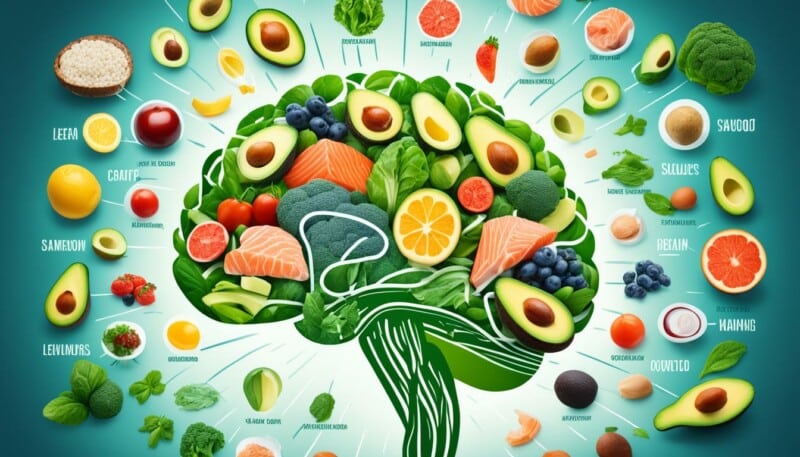Ketogenic Diet for Mental Health: Clarity & Focus

Are you looking for a natural way to boost your mental health? The ketogenic diet may hold the key to unlocking clarity and focus. In recent years, this low-carb, high-fat diet has gained popularity for its potential benefits in weight loss and managing various health conditions. But did you know that it can also have positive effects on your mental well-being?
The mental health benefits of a ketogenic diet are gaining attention as researchers explore the connection between nutrition and brain function. With its focus on reducing carbohydrates and increasing healthy fats, the ketogenic diet provides a unique approach to supporting optimal mental health.
Key Takeaways:
- The ketogenic diet may have transformative effects on mental health by enhancing cognitive function and mood stability.
- Adopting a low-carb, high-fat approach can potentially improve clarity, focus, and mental well-being.
- Further research is needed to fully understand the extent of the ketogenic diet’s impact on mental health.
- Exploring the potential benefits of the ketogenic diet for mental health is worthwhile for individuals seeking natural ways to support their well-being.
Understanding the Ketogenic Diet
The ketogenic diet, often referred to as the keto diet, is a low-carb, high-fat diet that has gained popularity in recent years. It involves consuming a low amount of carbohydrates and replacing them with healthy fats. This dietary approach aims to induce a metabolic state called ketosis, where the body primarily relies on fats for fuel instead of carbohydrates.
When following a keto diet, the body enters a state of ketosis, which has several potential benefits for mental well-being. One key advantage is the stabilization of blood sugar levels. By reducing the intake of carbohydrates and sugar, the keto diet can help regulate blood sugar, preventing drastic fluctuations that may contribute to mood swings and energy crashes.
Beyond stabilizing blood sugar, the keto diet has been linked to improvements in brain health. The brain relies heavily on glucose for energy, but in ketosis, it adapts to utilize ketones as an alternative fuel source. This shift in metabolism may have positive effects on cognitive function and mental clarity.
Research suggests that the keto diet may benefit mental well-being by reducing inflammation in the brain. Chronic inflammation has been associated with various mental health conditions, including depression and anxiety. By reducing inflammation, the keto diet may help alleviate symptoms and improve overall mental health.
In addition to its direct impact on brain health, the keto diet may also indirectly contribute to mental well-being by promoting weight loss and improving self-esteem. Losing excess weight can boost confidence and positively influence mental health.
It’s important to note that while the keto diet shows promise in promoting mental well-being, it may not be suitable for everyone. It’s always advisable to consult with a healthcare professional or registered dietitian before making significant dietary changes.
Ketogenic Diet Pyramid
When following the ketogenic diet, it’s helpful to have a visual representation of the recommended food groups and portion sizes. The ketogenic diet pyramid provides guidance on the types of foods to prioritize and the appropriate quantities to consume.
| Food Group | Serving Size |
|---|---|
| Healthy Fats | 75-85% |
| Protein | 10-20% |
| Low-Carb Vegetables | 5-10% |
| Herbs, Spices, and Condiments | Small amounts |
| Beverages | Water, unsweetened tea, coffee |
The ketogenic diet pyramid emphasizes the importance of incorporating healthy fats as the primary source of calories, followed by moderate protein intake and limited carbohydrates. It encourages the consumption of low-carb vegetables and emphasizes the use of herbs, spices, and condiments to enhance flavor without relying on added sugars or high-carb ingredients.
“The ketogenic diet offers an alternative approach to fueling the body and supporting mental well-being. By focusing on healthy fats and minimizing carbohydrates, individuals may experience improved cognitive function and enhanced brain health.”
The Connection Between Keto Diet and Mental Health
When it comes to mental health, the impact of diet cannot be overstated. The food we consume not only affects our physical well-being but also plays a significant role in our mental and emotional state. In recent years, the ketogenic diet has gained attention for its potential positive effects on mental health. So, how does the keto diet impact mental health, especially in relation to mood disorders?
Research suggests that adopting a ketogenic diet may have a profound influence on mood disorders such as anxiety and depression. The ketogenic diet, characterized by a high fat, moderate protein, and low carbohydrate intake, encourages the body to enter a state of ketosis. During ketosis, the body produces ketones as an alternative fuel source instead of relying on glucose.
By reducing carbohydrate intake, the keto diet helps stabilize blood sugar levels, which can play a role in mood regulation. Fluctuations in blood sugar levels can lead to irritability, mood swings, and decreased mental clarity. By maintaining stable blood sugar levels, the keto diet may promote a more balanced and stable mood.
Furthermore, the ketogenic diet is thought to have anti-inflammatory effects, which may be beneficial for individuals with mood disorders. Inflammation in the brain has been linked to the development and exacerbation of mental health conditions. By reducing inflammation, the keto diet may help alleviate symptoms of mood disorders and support overall mental well-being.
It’s important to note that while there is growing evidence suggesting a positive correlation between the keto diet and mental health, more research is needed to fully understand the mechanisms and long-term effects. Additionally, the keto diet may not be suitable for everyone, and it’s essential to consult with a healthcare professional before making significant dietary changes.
The Role of Ketogenic Diet in Mood Disorders: Evidence and Studies
Several studies have explored the relationship between the ketogenic diet and mood disorders, providing valuable insights into the potential benefits. In a study published in the Journal of Clinical Psychiatry, researchers found that a ketogenic diet was effective in reducing depressive symptoms in individuals with treatment-resistant depression. Another study published in the Journal of Child and Adolescent Psychopharmacology suggested that the keto diet improved symptoms of anxiety and irritability in adolescents with epilepsy.
“Our findings highlight the potential of the ketogenic diet as a complementary therapy for managing mood disorders. Further research is needed to delve deeper into the mechanisms and establish the optimal dietary protocols for mental health benefits.”
These studies, along with others in the field, provide promising evidence regarding the positive impact of the ketogenic diet on mood disorders. While more research is needed to establish the full extent of these benefits, the findings thus far support the notion that dietary interventions, such as the keto diet, can play a role in mental health management.
As with any dietary approach, it’s essential to consider individual needs and preferences. Consulting with a healthcare professional or registered dietitian can ensure personalized guidance and support when exploring the ketogenic diet for mental health benefits.
| Study | Findings |
|---|---|
| Journal of Clinical Psychiatry | Effectiveness of ketogenic diet in reducing depressive symptoms in treatment-resistant depression. |
| Journal of Child and Adolescent Psychopharmacology | Improvement of anxiety and irritability symptoms in adolescents with epilepsy. |
Remember, adopting a new diet should always be done under the guidance of a healthcare professional, especially when managing mental health conditions. While the keto diet shows promise in its potential impact on mental well-being, it’s important to approach dietary changes with awareness and informed decision-making.
Cognitive Function and Mental Health on a Ketogenic Diet
Following a ketogenic diet not only offers remarkable benefits for weight management and overall physical health, but it also shows potential advantages for mental well-being. Research suggests that the mental health benefits of a low-carb diet extend beyond mood stability, offering improvements in cognitive function as well.
One of the key ways a ketogenic diet may enhance cognitive function is by providing a stable source of energy to the brain. When following a low-carb, high-fat diet, the body enters a state of ketosis, where it primarily relies on ketones for fuel instead of carbohydrates. This shift in energy metabolism has been linked to increased mental clarity, focus, and brain performance.
A keto diet can also have a positive impact on anxiety and depression. Studies have shown that reducing carbohydrate intake and increasing fat intake can help regulate neurotransmitters associated with mood disorders. By stabilizing blood sugar levels and reducing inflammation, a ketogenic diet may contribute to a more balanced emotional state.
“The mental health benefits of a low-carb, high-fat diet extend beyond mood stability, offering improvements in cognitive function as well.”
Furthermore, a low-carb diet may support the production of brain-derived neurotrophic factor (BDNF), a protein that plays a crucial role in promoting the growth and maintenance of brain cells. Adequate levels of BDNF are associated with better cognitive function and protection against neurodegenerative diseases.
While more research is needed to fully understand the effects of a ketogenic diet on cognitive function and mental health, the existing evidence suggests promising potential. It’s important to note that individual responses to the diet may vary, and consulting with a healthcare professional or nutritionist is recommended before making any significant dietary changes.
By adopting a low-carb, high-fat approach, individuals may experience not only physical transformations but also improvements in mental clarity, focus, and emotional well-being. The cognitive benefits of a ketogenic diet, alongside potential relief from anxiety, depression, and other mental health conditions, make it an interesting avenue for further exploration in the field of mental health.

Summary:
- A ketogenic diet may contribute to improved cognitive function and mental well-being.
- By providing a stable source of energy to the brain, a low-carb diet can enhance mental clarity and focus.
- The ketogenic diet may help regulate neurotransmitters associated with anxiety and depression.
- A low-carb diet may support the production of brain-derived neurotrophic factor (BDNF), which promotes brain cell growth and maintenance.
- Individual responses to the ketogenic diet may vary, and professional guidance is recommended.
Conclusion
In conclusion, the ketogenic diet has shown promising potential in promoting mental health by enhancing clarity, focus, and mood stability. By adopting a low-carb approach, individuals may experience improvements in cognitive function and find relief from certain mental health challenges.
While further research is needed to fully understand the extent of the ketogenic diet’s impact on mental well-being, there is enough evidence to warrant exploration and consideration of its potential benefits. As more studies are conducted, we can gain a deeper understanding of the relationship between the ketogenic diet and mental health.
For those looking to optimize their mental well-being, incorporating a ketogenic diet alongside their existing treatment plan may offer additional support. It is important to consult with a healthcare professional or registered dietitian before making any significant changes to your diet.




